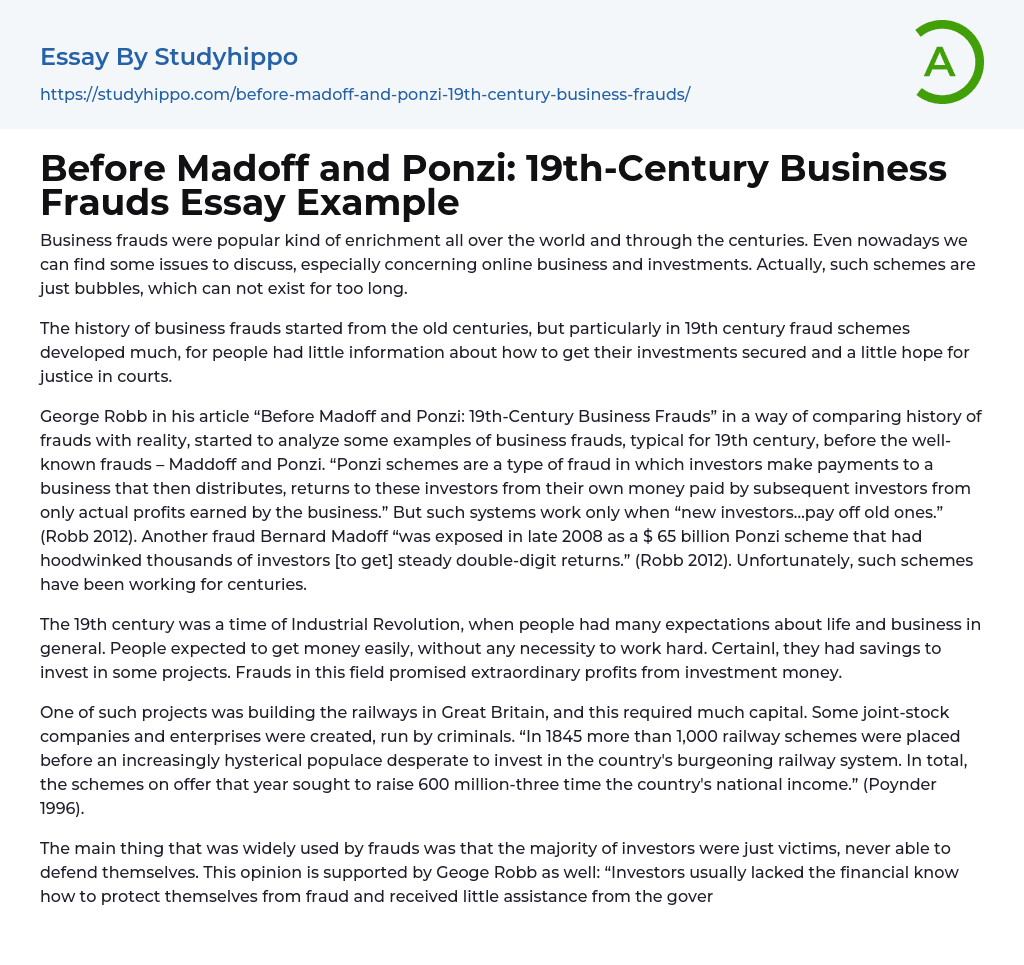

Before Madoff and Ponzi: 19th-Century Business Frauds Essay Example
Throughout history and across continents, business fraud has always been a popular means of enriching oneself. Even in today's world, there are numerous issues to discuss, particularly in the realm of online business and investments. However, these fraudulent schemes are inherently unsustainable.
Business frauds have existed since ancient times but truly thrived in the 19th century due to a lack of investment security knowledge and a belief that justice would not prevail in courts. In his article "Before Madoff and Ponzi: 19th-Century Business Frauds," George Robb examines the development of fraud schemes through historical examples preceding the well-known cases of Madoff and Ponzi.
Robb defines Ponzi schemes as fraudulent tactics where investors receive returns from their own funds as well as contributions from subsequent investors. These schemes can only succeed if new investors continue to pay off old ones. Madoff's $65 billion Ponz
...i scheme, exposed in 2008, managed to deceive thousands of investors by promising consistent double-digit returns.
Unfortunately, such fraudulent systems have persisted for centuries. The 19th century saw the emergence of the Industrial Revolution when people held high expectations for life and business ventures. They hoped to make easy money without exerting much effort and were willing to invest their savings in various projects. In this industry, fraudsters made extravagant promises of profits from investments.
One specific project consisted of building railways in Great Britain, which necessitated a substantial amount of capital. Criminals established joint-stock companies and enterprises to oversee these projects. By 1845, more than 1,000 railway schemes were presented to an eager public desperate to invest in the thriving railway system. These schemes sought to raise ?600 million, three times the nation's national income. Unfortunately
most investors became unknowing victims who lacked self-defense mechanisms. George Robb emphasized this lack of protection and highlighted how investors often had insufficient financial knowledge to safeguard themselves from fraud while receiving minimal government support. Robb also mentioned the deceitful "Railway King" known as George Hudson, whose company controlled a significant portion of England's railway tracks. Despite doubts concerning railroad profitability, many individuals fell prey to psychological manipulation and invested their savings only to receive no profit or return on their money. Additionally, Robb's research uncovered another case of fraud involving the "Ladies' Deposit Company," a bank specifically targeting female depositors. This bank was run by an uneducated woman who swiftly embezzled over $250,000 from approximately 800 female depositors. In Boston in 1879, a bank made enticing promises of doubling money within a year; however, these claims were hard to believe.
Only those with minimal savings, typically the poor, were deceived by this fraudulent scheme as a potential source of profit. When the media initiated a campaign against Sarah Howe, the leader of the bank, they claimed to be a charitable bank capable of doubling profits. According to George Robb, false company shares or immediate bankruptcy are the most frequent types of fraud that can still occur. The perpetrators always possess extensive business knowledge while their unsuspecting victims rely on advertisements or advice from individuals promoting starting a business without considering profitability. As a result, these schemes convince people to invest in mere soap bubbles instead of genuinely profitable companies. Often, well-known public figures such as politicians or religious leaders orchestrate frauds by gaining people's trust with regards to their savings without any hesitation. With the
recent growth in web development, there has been an increase in fraudulent schemes targeting victims for their money. Unfortunately, those responsible for these schemes can easily disappear with the funds and leave the victims with limited options and little motivation to pursue legal action. Moreover, such schemes are occurring more frequently compared to the 19th century. It is worth noting that both Ponzi and Madoff schemes continue to be widely used.
- Commercial Bank essays
- Debit Card essays
- Deposit Account essays
- Subprime Lending essays
- Accounting essays
- Marketing essays
- Automation essays
- Business Cycle essays
- Business Model essays
- Business Operations essays
- Business Software essays
- Corporate Social Responsibility essays
- Infrastructure essays
- Logistics essays
- Manufacturing essays
- Multinational Corporation essays
- Richard Branson essays
- Small Business essays
- Cooperative essays
- Family Business essays
- Human Resource Management essays
- Sales essays
- Market essays
- Online Shopping essays
- Selling essays
- Strategy essays
- Management essays
- Franchising essays
- Quality Assurance essays
- Business Intelligence essays
- Corporation essays
- Stock essays
- Shopping Mall essays
- Harvard Business School essays
- Harvard university essays
- Trade Union essays
- Cooperation essays
- News Media essays
- Waste essays
- Andrew Carnegie essays
- Inventory essays
- Customer Relationship Management essays
- Structure essays
- Starting a Business essays
- Accounts Receivable essays
- Auditor's Report essays
- Balance Sheet essays
- Costs essays
- Financial Audit essays
- International Financial Reporting Standards essays



